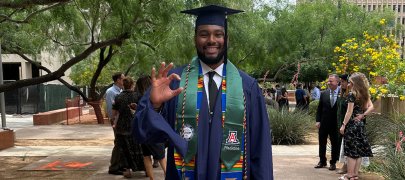
$3.9 Million Grant Seeks to Expand Primary Care and Rural Tracks for Medical Student Training in Arizona

Arizona is one of the fastest-growing states in the United States, but it is facing critical shortage of primary care physicians. Today, Arizona currently ranks 42nd in primary care access and will need 1,941 primary care physicians by 2030 to meet growing demand, according to the Association of American Medical Colleges.
To help address this issue, a $3.9 million grant has been awarded by the Department of Health and Human Services to expand primary care and rural health training opportunities for University of Arizona College of Medicine – Phoenix medical students.
Sharry Veres, MD, MHSM, chair of the Department of Family, Community and Preventive Medicine at the U of A College of Medicine – Phoenix, Kathleen Brite Hillis, MD, associate dean of Community Engagement, and Jonathan Cartsonis, MD, director of the Longitudinal Integrated Clerkship, developed the program in partnership with several underserved communities across Arizona.
“Medical students and resident physicians who train in rural places have a higher likelihood of working in rural places after their training,” Dr. Veres said. “In order to attract students who are interested in working in rural and underserved locations, we need to have a curriculum and locations that will reinforce and enhance the training they are looking for.”
The three-year project, which launched September 30, will expand clinical experiences, enhance clinical curriculum and increase primary care residency matches. The grant’s first aim is to create more primary care and rural health admissions tracks to attract medical students interested in practicing in these areas. It also hopes to expand tribal, rural and community health center-based clinical experiences, including Federally Qualified Health Centers and the longitudinal integrated clerkship (LIC).
“Drs. Cartsonis, Brite Hillis, and other dedicated leaders at the University of Arizona College of Medicine –Phoenix have been working on all of the pieces to this grant for more than five years, looking for ways to enhance the value of our medical education programs,” Dr. Veres said. “The ideas in the grant pull these pieces together into a cohesive program that achieves ’end-to-end’ solutions to target the primary care workforce shortage."
To attract medical students who are committed to rural health and primary care, five competitive scholarships will be awarded that will cover three years of medical school tuition.
The recipients for these scholarships will be students who have the background and dedication needed to achieve the grant’s target outcomes.
“These will be students who have experiences with rural and underserved populations and communities, a personal and vested interest in this area of medicine and a willingness to commit to a rural and underserved primary care career,” Dr. Veres said. “We want to know and understand the ‘Why?’ behind their commitment when we invest early in their success.”
The Pathway Scholars Program provides a holistic foundation for Arizona pre-med students to succeed in the rigors of medical school at the College of Medicine – Phoenix. In the second year of this project, the Pathway Scholars Program class size will expand from 12 to 16 students.
Dr. Veres said programs like the Pathway Scholars Program are successful across the country with a strong track record of preparing students for success in medical school.
“We know that this program is important in our ability to pull the right students into that pathway of medical school,” Dr. Veres said. “This one-year master’s program allows post-baccalaureate students the ability to hone their reading for medical school with the right supports in place.”
Sustaining the program beyond the three years provided by the grant will require overcoming significant challenges. Limited access to health care facilities in rural and tribal communities is top of mind for Dr. Veres. To address this, she and her colleagues will pursue continued funding specifically designed to support health care in underserved areas.
Topics
About the College
Founded in 2007, the University of Arizona College of Medicine – Phoenix inspires and trains exemplary physicians, scientists and leaders to advance its core missions in education, research, clinical care and service to communities across Arizona. The college’s strength lies in our collaborations and partnerships with clinical affiliates, community organizations and industry sponsors. With our primary affiliate, Banner Health, we are recognized as the premier academic medical center in Phoenix. As an anchor institution of the Phoenix Bioscience Core, the college is home to signature research programs in neurosciences, cardiopulmonary diseases, immunology, informatics and metabolism. These focus areas uniquely position us to drive biomedical research and bolster economic development in the region.
As an urban institution with strong roots in rural and tribal health, the college has graduated more than 1,000 physicians and matriculates 130 students each year. Greater than 60% of matriculating students are from Arizona and many continue training at our GME sponsored residency programs, ultimately pursuing local academic and community-based opportunities. While our traditional four-year program continues to thrive, we will launch our recently approved accelerated three-year medical student curriculum with exclusive focus on primary care. This program is designed to further enhance workforce retention needs across Arizona.
The college has embarked on our strategic plan for 2025 to 2030. Learn more.


